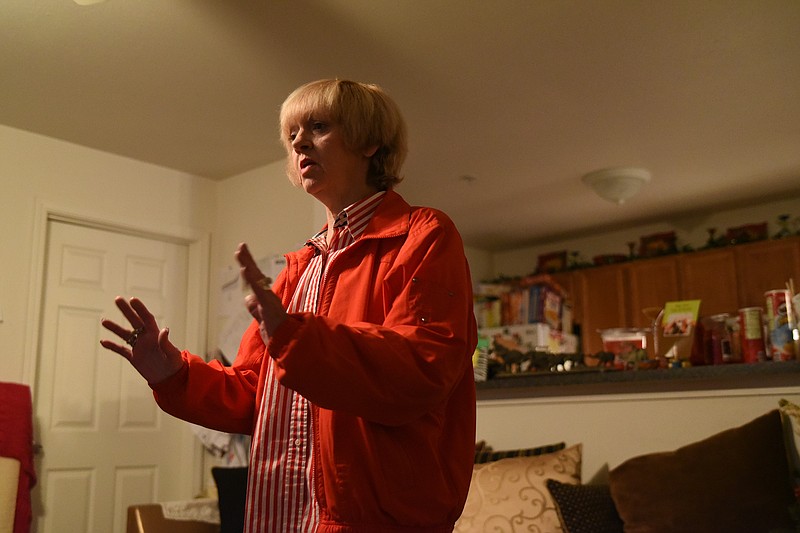God gave me Lindsay. She helps me cope. I don't know where I would ever be without her. I just don't want to lose her."
As she looks around her small apartment, Donna Robertson can relate almost every object she sees to her gratitude for a woman named Lindsay.
Pinned to the wall is a motivational article bearing the headline, "Overcome excuses and meet your goals."
"Lindsay gave that to me," Robertson, 61, says with a smile.
Pointing at a photo of her 13-year-old grandson, Robertson talks about how "Lindsay helps me read his school documents right, and helps me make sure I'm not missing anything."
Even the fact that she lives in this apartment, she says, is a testament to Lindsay, who helped get her approved for voucher housing, and aided her fight to get a bottom-floor space, since Robertson has trouble getting up stairs.
"I could not manage myself without Lindsay," she says.
"Lindsay" is Lindsay Malone, Robertson's case manager with Joe Johnson Mental Health Center. Robertson has grappled with bipolar disorder for decades. In the past, she's had trouble with the law, trouble finding enough money to keep herself fed and to keep the lights on. But these days she feels steady. Much of it, she says, has to do with Malone's help and her bimonthly visits.
"If I did not have Lindsay by my side -- I do not even want to think of it. It's frightening," she said.
Sitting in a McDonald's in the Highway 58 area, Martha Massey says the same thing. She usually meets with Malone here each week to talk about goals and progress. Massey, 38, is a recovering alcoholic who struggles with severe anxiety and depression. But she is gaining traction for the first time in a long time, she says. She is sober, on good medication and working on her GED. She hopes to take interpretive sign language classes so she can better converse with her deaf daughter.
"God gave me Lindsay," Massey said. "She helps me cope. She keeps me focused. When I need her, she always picks up the phone. I don't know where I would ever be without her. I just don't want to lose her."
Case managers like Malone play a crucial role in the mental health care system, standing between their fragile clients and hospitals, jails or the streets.
Psychiatrists may prescribe medicine, but case managers help make sure the clients swallow it. Doctors may provide care, but case managers arrange rides to the appointments. They link people to affordable homes. They serve as advocates, coaches, even friends -- "lifelines," describes Donna Maddox, director of Joe Johnson Mental Health Center, part of the 31-county Volunteer Behavioral Health Care Services.
That is why she, Robertson, Massey and others are so worried about TennCare's plans to cut back the state's Level 2 case management services.
In its budget proposal this year, TennCare is looking to restrict which people receive case management services and for how long.
Currently, 42,000 to 48,000 adults with severe and chronic mental illness use case managers in the state each year.
Under the proposal, only people coming out of a mental health crisis, like hospitalization, would qualify for a case manager. And help would be guaranteed only for 90 days.
At that point, the client would be evaluated by the insurance company that manages their TennCare account, with input from their mental health provider, to decide whether case management was still necessary.
Greg Lewis, chief clinical officer of Volunteer Behavioral Health Care, said the organization manages cases for about 15,000 people, including 1,500 long-term cases. Lewis estimates the cuts would affect about 600 adults at Joe Johnson alone.
"These cuts are some of the most severe I have ever seen to community mental health services," he said.
Keith Gaither, TennCare's director of managed care operations, said the goal is not to cut out case management services entirely, but to serve just those who really need them for therapeutic reasons.
"The goal has always been for people to move towards recovery, and not to be on this service for too long," said Gaither.
The move, state officials say, would lead to a $30 million budget reduction -- $10 million in state money and $20 million from a federal match.
But Maddox and others say the state could "bear a greater tax burden in the long run."
"This could have a profoundly negative ripple effect," said Maddox. "We're going to see more people in our [emergency rooms], more people in our jails. We have the potential to see an increase in homelessness."
Forty percent of the roughly 500 inmates in the Hamilton County Jail needed psychotropic medication as of last fall. Psych meds alone cost the county $68,800 last year.
Gaither says that such outcomes "are certainly not our goal" with the proposed limits.
"We do recognize that this is a gray area, and that the needs are individual," he said. "We've just got a limited amount of dollars. ... And we need to standardize the clinical guidelines for this service."
'WHOLE PERSON' HELP
The people who qualify for state-funded case management services rarely have mild disorders. Most have battled severe, life-long mental illness.
Local clients include everyone from a college student, away from home and recently diagnosed with schizophrenia, to a mother of two sons killed by gang violence. Others, like 47-year-old Derek Dickerson, have long histories of alcohol or drug use.
Homeless and facing liver failure, Dickerson reached a breaking point in 2010. He entered a rehab program where he was able to get sober "with God's help," he said. But his severe depression and anxiety remained, and day-to-day stability was difficult to find.
But Matthew Naylor, Dickerson's case manager with Helen Ross McNabb Center, has helped him bridge the gaps. Naylor makes sure he has rides to doctor appointments, helped him get glasses and ensures he's not isolating himself. He's encouraged Dickerson to pursue his passions for electronics and design work.
"Case managers help the whole person," said Dickerson.
Naylor said his goal for his clients is more independence,"but everyone has a different time frame."
Naylor has about 30 people in his caseload, including 61-year-old Homer Stone, who has lived his whole life with schizophrenia. Stone remembers mental health care in the days before case managers.
"You had your psychiatrist, but he can't leave the office," Stone said. "He could not look out for you out in the world, in your home. The case manager checks on you, which people need. They help keep you out of the hospital."
Jerry Vagnier, CEO of Helen Ross McNabb, said there are 600 fewer psychiatric beds at state hospitals since TennCare was created.
"Case management has been the community support to keep people out of these hospitals. This kind of move would just be regressive," Vagnier said.
He said 2,000 people served by Helen Ross McNabb would be affected by the cuts, including roughly 500 at the Hamilton County branch.
Stone and Dickerson say 90 days is not enough for someone coming out of crisis to find stability, especially if they are homeless, jobless, profoundly disabled, or all of the above. If anything, they say, mental health programs like case management need to be expanded.
"If you separate the case manager too soon, it's like reading half a book," Vagnier said. "You never get to see the completion of what you could become."
NASHVILLE RESPONSE
The growing outcry against the cuts has hit lawmakers' ears. State Sen. Bo Watson, R-Hixson, vice chairman of the senate Health and Welfare Committee, has recommended that some or all of the funds be restored to the governor's budget.
"I think everyone recognizes case managers are an important part of the mental health system," Watson said.
Gov. Bill Haslam's staff has said they are revisiting the matter, and has asked TennCare to consult more closely with mental health providers as budget talks continue.
If the budget proposal passes, the new system would be put in place for new clients starting this year. Clients like Robertson and Massey, who have established relationships with their caseworkers, would be re-evaluated eventually, but the time line is less clear.
Robertson said she is terrified at the prospect of losing Lindsay. She doesn't know how to fight the decision, she said, but she wants to try. Massey says the same.
"She fights for me," Massey said. "I'm going to fight for her."
Contact staff writer Kate Belz at kbelz@times freepress.com or 423-757-6673.

